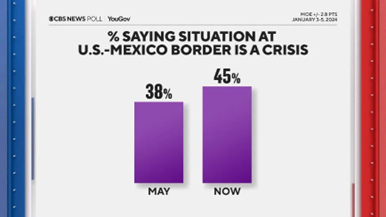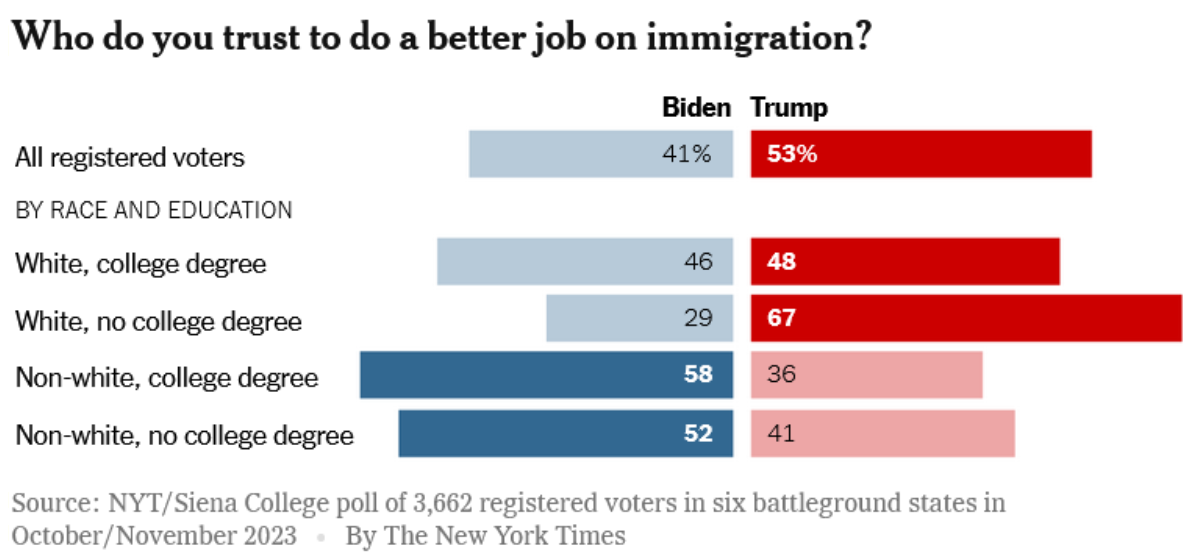The Daily Escape:

Sunset, Roan Mountain, TN – January 2024 photo by Arpana Goyal
It’s time to talk about immigration. Immigration is a huge political football not only in the US, but throughout Europe. In all cases, the hard political Right is anti-immigration while the political center and left continue to try to duck the issue wherever possible.
Immigration is an extremely complicated issue that will figure prominently in our 2024 election. So far, the debate has been largely one-sided, with Republicans on the attack, and Democrats in a defensive crouch. In essence, the arguments break down to this: Democrats want more money to process the historic immigrant backlog while Republicans want to stop people from coming here in the first place. The politics of this for Dems are fraught.
But before we get to the 2024 election, the subject of immigration and the US southern border is already at center stage in the continuing effort to fund the government beyond the current Continuing Resolution that could end with another possible government shutdown in early March.
The complicating issue for avoiding a government shutdown is Biden’s request for funding for Ukraine. The MAGA House Republicans, including Speaker Johnson (R-LA), oppose the money for Ukraine and say that they won’t approve Biden’s request without dealing with the crisis at the border. From Dan Pfeiffer: (brackets by Wrongo)
“To summarize, Johnson demands a border bill in exchange for passing Ukraine aid; the White House and Senate [are] work[ing] on a border bill; Johnson opposes the bill without even seeing it, despite repeatedly declaring that the “crisis at the border” is the House GOP’s top priority.”
When Ukraine aid became a Democratic policy priority, it pushed Republicans who were once advocates of the Ukraine war effort to abandon their support.
The Republicans see the border crisis as a huge political vulnerability for Biden and want to keep the issue in limbo until after the election. Polling bears this out. A January CBS News/YouGov poll shows that the number of Americans who say the situation at the border is a “crisis” has gone up 7 points since May of last year:

There’s no question the Right has used their propaganda apparatus to put the situation at the border on the radar screen for voters. The chart below shows that in the NYT/Siena college poll, Biden is lagging Trump on who is trustable on immigration:

The biggest reason for the shift seems to be the surge of illegal immigration during Biden’s term. Many would-be migrants correctly believe that as long as they can reach US soil, they will be able to stay for years.
Let’s look at some numbers for October 2022 – September 2023 (the US fiscal year):
- There were 3.1 million attempted crossings at the US Southern border in 2023. Of that total, an estimated 600,000 entered undetected. That leaves 2.5 million migrants that were “encountered” by the US border patrol, over two and a half times the number just four years ago. 83 percent of the encounters occurred between US ports of entry, often in remote locations like the Sonoran Desert. Over half a million were expelled under Title 42, a policy enacted under Trump that allowed border officials to expel migrants without a deportation hearing. The Biden administration lifted that policy in May 2023.
- Of that 2.5 million, 1.9 million were “processed” under Title 8 of the immigration Law, covering asylum, visas, refugees and deportations.
- Of that 1.9 million, 1.5 million became new immigration court cases in 2023.
This has caused a huge jump in the backlog of immigration court cases. Today, it takes an average of 3 years to complete an immigration case in the US, largely due to the fact that the backlog per judge now stands at 4,500 cases, up from around 1,000 cases in 2020.
Science tells us that you can’t put two pounds of shit in a one pound bag, so despite the wringing of hands on the part of the US political Left, immigration must be addressed. For the past few months, the White House has been trying to find a compromise with Republicans in hopes of reaching a deal on border security. But so far, the talks between the designated negotiators in the Senate (Chris Murphy D-CT, James Lankford, R-OK, and Kyrsten Sinema, I-AZ), haven’t found an agreed path forward.
Presuming the details of any Senate deal are within the range of what would be acceptable, getting a border deal and passing aid for Ukraine and Israel would be the best outcome for Biden and the Democrats. Dems might be forced to play the cards as they’re dealt. Biden should take the deal and declare a victory for bipartisan politics.
The biggest shift is that the Democrats are reluctantly realizing that they are holding to a losing position. Many asylum claims are bogus and are simply people looking for a better economic life. We need to make policy about how many immigrants the US should be looking to bring into the country every year. That policy should balance the number of immigrants with our ability to help them get started on a fruitful life.
That still would be a pretty large number. It just can’t be infinite.
Time to wake up Democrats! We’re headed for the first presidential election rematch since 1956. Both candidates are unpopular and both are also extremely well-known to voters. That means for the first time in forever, a clear understanding of the policy stakes of an election will be important. That makes our immigration policy important.
To help you wake up, listen to “Why Do We Build The Wall?” from the 2019 Broadway play “Hadestown”. The song was written by Anaïs Mitchell, and this is from her 2010 album “Hadestown”. Note that this song was written in 2010, long before Trump or any politician had any interest in building a wall:
Sample Lyric:
Who do we call the enemy?
The enemy is poverty,
And the wall keeps out the enemy,
And we build the wall to keep us free.
That’s why we build the wall;
We build the wall to keep us free.

I believe most countries have annual immigrant quotas, some based on “sponsorship”, skills, inward investment, and/or motivation (e.g.- asylum vs economic hardship). The US has an anticipated growing skilled labor shortage due to demographics. So it seems logical to debate and determine a concensus quota number and qualifiers rather than simply increasing border enforcement budgets and squabbling over a wall design. Infinite immigration is not sustainable politically, economically or socially; nor is the capacity to augment the judicial system exponentially. Climate change, political instability, and rising organized crime will no doubt exacerbate demand. Border enforcement and processing could become more tenable if potential migrants were informed in their countries that quotas are filled and the border is closed. Dems need to publicly put a workable, contained plan on the table.